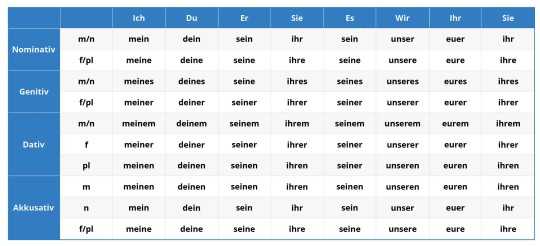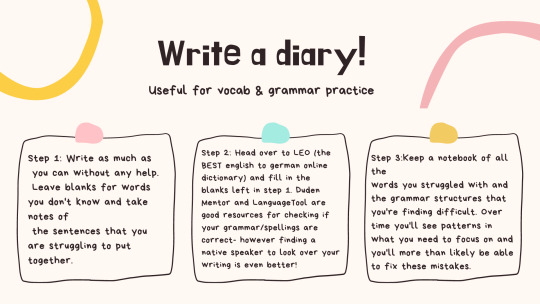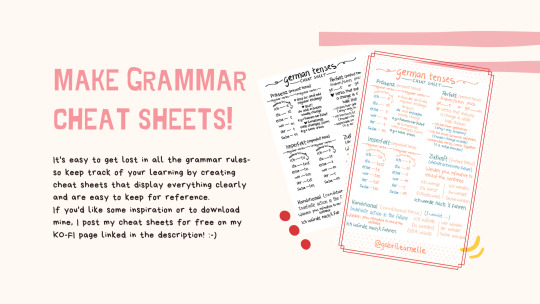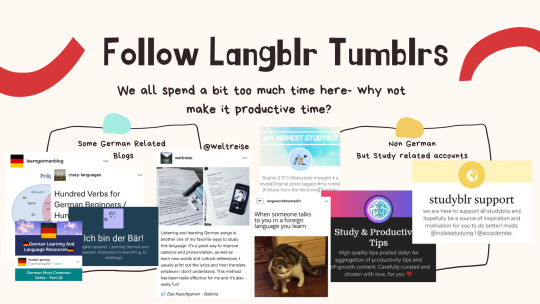neen - 17 - learning german (B1/B2) 🇩🇪 and yiddish ✡️ - native brazilian portuguese speaker
Don't wanna be here? Send us removal request.
Text
I don't have a gender why must German have one I don't get it
0 notes
Text
The German Cases / die deutschen Fälle
What are cases?
A case shows the function of a noun or a pronoun in a sentence. In many languages, words change their form or add different endings according to their function in a sentence. For example, they change depending on whether the word is the subject or the object of the sentence. These changes and different endings are called ‘cases’.
The German language has four cases:
Nominative (Nominativ)
Accusative (Akkusativ)
Dative (Dativ)
Genitive (Genitiv)
These cases are very important in German grammar as they dictate the endings of adjectives and indefinite articles. They can also tell you which personal pronoun to use.
1. The Nominative Case
This case tells us who or what is doing something. The subject might be performing a certain action or have a certain characteristic. In German, the easiest way to tell the Nominative from other cases is to ask “Who or what is doing XYZ?”
Therefore, the nominative is known as the Wer-Fall (the who-case).
For example:
Wer lacht? (who is laughing?) → Das Mädchen lacht. (The girl is laughing.)
Was ist bunt? (What is colorful?) → Das Haus ist bunt. (The house is colorful.)
Wer bellt die Frau an? (Who barks at the woman?) → Der Hund bellt die Frau an. (The dog barks at the woman.)
There are certain verbs in German that only take nominative form. Some of them are sein (to be), werden (to become) and bleiben (to stay)
2. The Accusative Case
Similarly to the nominative, the accusative’s operative question is also “what?” There is, however, a major difference between the two. In the case of the accusative, the person (or animal, or object) you are talking about is affected by the action. This is called the direct object.
Er schreibt Bücher. (He writes books.) ← What does he write?
Sie haben die Kirschen gegessen. (They have eaten the cherries.) ← What have they eaten?
Sie hat ein Bild gemalt. (She painted a picture.) ← What did she paint?
3. The Dative Case
This case is all about the indirect object. The indirect object is an object that is being passively influenced by whatever action is taking place.
Er schenkt seiner Freundin Blumen. (He gives his girlfriend flowers.)
“He” is the subject of the sentence.
The verb (obviously) is “to give”.
The direct object is the flowers that are given.
And then there’s his girlfriend: She’s really just there passively receiving the gift—she is the indirect object of the sentence.
Same with this example here:
Ich gab ihm den Schlüssel. (I gave him the key.)
In this case, “I” is the subject of the sentence, whereas “the key” is the direct object. The verb here is “to give” as well, and the indirect object is “he” who I gave the keys to.
When there’s a dative involved, you’ll always have to ask yourself “Who to?” or “Who for?”, or also “Whom?”. These three questions are indicative of the dative case.
4. The Genitive Case
Its main function is to show possession similar to the English ’s or the preposition of. The operative word here is “Whose?” So whenever you see a sentence like:
Die Jacke des Mannes ist schwarz. (The man’s jacket is black.)
The special thing about the genitive is that when it’s applied, the endings of certain nouns (namely masculine nouns and neuter ones) change.
Examples:
Der Hund → des Hundes
“Das Fell des Hundes ist schwarz.” (The dog’s fur is black.) ← Whose fur is black?
When a sentence is in the genitive case, the letters –es are added to some words, especially those that have only one syllable and end in a consonant.
Das Blatt → des Blattes (the leaf vs. the leaf’s)
Der Mann → des Mannes (the man vs. the man’s)
If a word ends in –en, –el or –er, usually only an –s is added. This happens especially in masculine nouns or those that are neuter.
Examples:
Das Kaninchen → des Kaninchens (the bunny vs. the bunny’s)
Der Leiter → des Leiters (the leader vs. the leader’s)
Der Beutel → des Beutels (the tote vs. the tote’s)


420 notes
·
View notes
Text
GERMAN YOUTUBERS MEGAPOST

Hey German Study Buddies,
I think watching German youtube for the past year or so has allowed my German to improve so much. Adopting the German colloquialisms and listening to the fluency and grammar structures in the videos has really helped me so so much! For anybody learning a language: youtube is the best!
Not only is it fun to watch the many funny videos or hauls (yes…I have obsession with clothing hauls), but also you can learn so much by just continually listening to the German. Anyway, it took me a while to find these German youtubers so I thought I would share them in one big master post here:
PS: if you know any other good German youtubers let me know and I’ll add to the list! :) PPS: I put a little heart next to my favourite ones x
Funny Videos: ♡ Luca Con-Crafter: https://www.youtube.com/user/ConCrafter Lifestyle : ♡ Anika Teller: https://www.youtube.com/channel/UCUyjVrHZ5lpKSOEkXASdt7w Anne Welt : https://www.youtube.com/user/annewelt ♡ Hannah : https://www.youtube.com/channel/UCr7AU8iyxuCcedAwy4vJQHQ Taimi: https://www.youtube.com/user/MyLittlePinkMuffin ♡ Ema Louise: https://www.youtube.com/user/xXTheMakeUpGuruXx Diana zur Löwen: https://www.youtube.com/user/dfashion100germany Laren Joelle: https://www.youtube.com/user/LaurenCocoXO/videos Bibis Beauty Palace: https://www.youtube.com/user/BibisBeautyPalace Rebekah Wing: https://www.youtube.com/channel/UCHKVTtxg9yRJ_5KDMZFCkCw/videos ♡ Shanti Tan: https://www.youtube.com/user/TheMsMania ♡ Ischtar Isik: https://www.youtube.com/user/isipisi5 ♡ Katharine Damm: https://www.youtube.com/user/katharinadamm/videos Laura Lareeva: https://www.youtube.com/user/youshouldalwaysfeel/videos xLaeta: https://www.youtube.com/user/xLaeta/videos Bonny Trash: https://www.youtube.com/channel/UC1FUmelOA9Tc8VFmoeexIkw/videos ViktoriaSarina: https://www.youtube.com/user/ViktoriaSarina/videos Lisa-Marie Schiffner: https://www.youtube.com/channel/UCrVsCGkgj5Yz6d5l7etndkg Tina Neumann: https://www.youtube.com/channel/UCU1scWF4_I3SgoO9px3K-1g/videos Barbara Sofie: https://www.youtube.com/user/Barbieloveslipsticks/videos Douniaslimani: https://www.youtube.com/user/douniaslimani/videos Gronkh: https://www.youtube.com/user/Gronkh/videos Cold Mirror: https://www.youtube.com/watch?v=MWr0CosN0dY Space Radio: https://www.youtube.com/user/SpaceFrogsRadio Space Frogs: https://www.youtube.com/user/SpaceFrogsEnt Doktor Allwissend: https://www.youtube.com/user/doktorallwissend Marti Fischer: https://www.youtube.com/channel/UC78yJH3WrmLE6AyL0OgPV7g Mr Wissen 2 Go: https://www.youtube.com/user/MrWissen2go/videos Applear Pictures: https://www.youtube.com/user/ApplewarPictures Marmelade Oma: https://www.youtube.com/channel/UCSSUG_vo76v04FKRnsWavMA/videos LeFloid: https://www.youtube.com/user/LeFloid Unge: https://www.youtube.com/user/unge
@suplanguages @deutschundlola @languageoclock @languagesandshootingstars @dialect-warrior
3K notes
·
View notes
Text







Here are some of my unusual ways of studying German! I hope this helps some of you out✨
Mentioned Blogs : @learngermanblog / @mutant-german / @ich-bin-der-baer / @myhoneststudyblr / @crazy-languages / @weltreise / @langsworldmemes01 / @productive-tips / @studyblr-support
3K notes
·
View notes
Text
Hey!
I'm Neen and, quite honestly, have no idea what I'm doing most of the time. I'm a native Brazilian Portuguese speaker, fluent in English and passable in Spanish. I have been studying German for about 4 years. I took an interesting in Yiddish, but as it stands, it's not my priority.
I'm on my senior year and will probably not post too much on here because *vague gestures* the world is hard. But I'll try.
Hope I can make some friends! <3
1 note
·
View note
